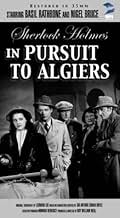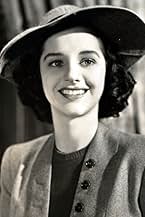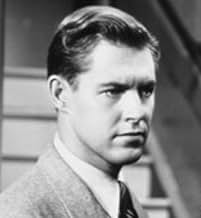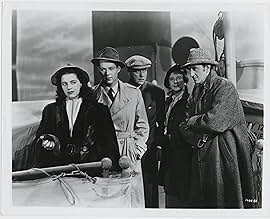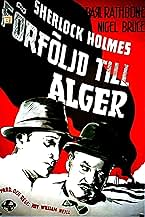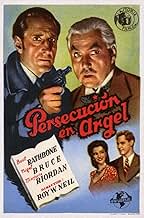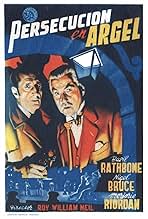VALUTAZIONE IMDb
6,7/10
4379
LA TUA VALUTAZIONE
Aggiungi una trama nella tua linguaHolmes is recruited to escort the heir to a European throne safely back to his homeland after his father's assassination.Holmes is recruited to escort the heir to a European throne safely back to his homeland after his father's assassination.Holmes is recruited to escort the heir to a European throne safely back to his homeland after his father's assassination.
- Regia
- Sceneggiatura
- Star
William 'Wee Willie' Davis
- Gubec
- (as Wee Willie Davis)
Frederick Worlock
- Prime Minister
- (as Frederic Worlock)
Wilson Benge
- Clergyman
- (non citato nei titoli originali)
Sven Hugo Borg
- Johansson
- (non citato nei titoli originali)
Ernst Brengt
- Ship Passenger
- (non citato nei titoli originali)
James Carlisle
- Aide
- (non citato nei titoli originali)
Ashley Cowan
- Steward
- (non citato nei titoli originali)
James Craven
- Anton Petzval
- (non citato nei titoli originali)
Recensioni in evidenza
Despite planning a fishing and shooting holiday in Scotland, Holmes and Dr Watson are approached to help smuggle the Prince Royal of another country back into his homeland. The King has been assassinated already and the Prince is feared to be next. Holmes and the Prince go by plane while Watson travels by boat as a decoy. When Holmes' plane is shot down Watson fears the worst until he finds that Holmes et al are already on the boat. With many days left before Algiers, Holmes must outwit the assassins he suspects are onboard.
I've always enjoyed Watson's contribution to these films just as much as I have Holmes, so I was worried when it looked like Watson would be separated from Holmes for the film. So imagine my happiness when the film actually followed Watson rather than Holmes. Although the film brings Holmes back together with Watson quite quickly, it does give Watson a lot more screen time and respect than they usually do - even going as far to have Holmes praise Watson for his observational skills! This makes a refreshing change - of course Holmes is still the star but it is nice to see him on an almost equal platform for once.
The plot itself is a little worrying at the start but settles once Watson gets on the ship. It allows for some gentleman playing between Holmes and his pursuers who are known to him. This is fun and allows for some nice twists toward the end. The whole thing about the stolen jewels was lost on me and just distracted from the main narrative.
Rathbone is as good as ever and is well worth watching but it is Bruce that impresses here. He does his usual stuff but he gets time to do it and it is fun to see him not being put down by Holmes so much. Holmes' pursuers are better than his usual foes - the amount of screen time that they share and the fact that they are known to each other makes it more enjoyable.
This is a great entry in the series. Bruce rises to the occasion and the twisty confrontation on the ship is very enjoyable as Holmes stays one step ahead. And, having seen the last couple of films end on Holmes giving moral speeches here the film ends on a killer line from Holmes where he advises Watson `never become an actor' - hilarious!
I've always enjoyed Watson's contribution to these films just as much as I have Holmes, so I was worried when it looked like Watson would be separated from Holmes for the film. So imagine my happiness when the film actually followed Watson rather than Holmes. Although the film brings Holmes back together with Watson quite quickly, it does give Watson a lot more screen time and respect than they usually do - even going as far to have Holmes praise Watson for his observational skills! This makes a refreshing change - of course Holmes is still the star but it is nice to see him on an almost equal platform for once.
The plot itself is a little worrying at the start but settles once Watson gets on the ship. It allows for some gentleman playing between Holmes and his pursuers who are known to him. This is fun and allows for some nice twists toward the end. The whole thing about the stolen jewels was lost on me and just distracted from the main narrative.
Rathbone is as good as ever and is well worth watching but it is Bruce that impresses here. He does his usual stuff but he gets time to do it and it is fun to see him not being put down by Holmes so much. Holmes' pursuers are better than his usual foes - the amount of screen time that they share and the fact that they are known to each other makes it more enjoyable.
This is a great entry in the series. Bruce rises to the occasion and the twisty confrontation on the ship is very enjoyable as Holmes stays one step ahead. And, having seen the last couple of films end on Holmes giving moral speeches here the film ends on a killer line from Holmes where he advises Watson `never become an actor' - hilarious!
Since the wartime production (1945) of the Sherlock Holmes' adventure, "Pursuit to Algiers", many films have been made involving a seagoing setting. Mysteries set aboard a ship I suggest are notoriously easy to begin and difficult to consummate; this is because it is easy to introduce characters in a claustrophobic setting but notoriously more difficult to arrange for a series of logical events perpetrated by them that is varied, believable and possessed of a wide-enough scope of action. I find "Pursuit to Algiers" to be an unusually believable decently-filmed low-budget ship-based adventure and a tidy storyline without any need for apologies. The writers began the piece on land, in fact using a low-grade but intriguing series of clues--recognized by detective Sherlock Holmes as such--to lure him to an expositional meeting. At that meeting, the Prime Minister of a fictitious Balkan country, one whose king has been murdered (though this fact has not been made public), hires the famous consulting detective to safeguard the nation's young prince as he heads home from his school in England to his homeland for a now-vital coronation ceremony. Holmes accepts the commission; then he heads off in an airplane, planning to meet his friend Dr. Watson later, for several reasons. Watson has cause to believe he has been killed; but he eventually does meet his partner aboard the ship they had planned to sail on, after several neat plot twists and a display of unusual intelligence by Holmes; and from then on, the two are kept exceptionally busy trying to assess who the potential murderers are (who will be their deadly opponents). They are given a fairly large cast of suspects to choose from. Holmes then neatly thwarts the villains at every turn, until near the end he is knocked unconscious and the prince is kidnapped--exactly as Holmes had planned. Basil Rathbone is less effective than usual as Holmes and Nigel Bruce more useful as Watson than he was usually permitted to be; he sings beautifully, and acts as an effective comedic foil to his sharp-eyed and sharp-witted partner throughout. Among the larger than usual cast for a Holmesian adventure, Rosalind Ivan as a noisy matron is far better than thin, pretty Marjorie Riordan who sings better than she acts. Veteran heavies Martin Kosleck, John Abbott, Rex Evans and Gerald Hamer steal the film as clever but outwitted suspects or murderers; aboard such a small ship, the scenarists permit the suspects and even the villains to interact with and try to outthink Holmes quite directly, a rarity outside seagoing comedic tales (and, I find, the film's primary distinguishing feature). Frederick Worlock is affecting as the Prime Minister; the young men in the cast are all routine at best. This film was kept moving swiftly and ably by its producer-director, veteran Roy William Neill; the script was done as a screenplay by Leonard Lee adapted from elements of an Arthur Conan Doyle story. The feature's cinematography by Paul Ivano and art direction by John B. Goodman and Martin Obzina are above average; Vera West's costumes are done on an admirably high level throughout. Bernard Brown, for once, keeps a British film's voices and sounds perfectly intelligible. Some of the scenes aboard the ship are quite realistic; others are less successful, although Russell A. Gausman and Ralph Sylos try manfully to make every setting from a cafe to cramped staterooms believable. The seminal portions of this film I assert are the dialogue interactions of the characters which take place throughout; despite the dialogue sometimes being low-key, it is adult, convincing and serviceable from beginning to end. This is a very good second feature by my standards, if no more, on a par with The Woman in White, and quite tightly plotted.
Please make sure and get the UCLA restored version of this classic on DVD. There are some appalling Public Domain versions of the Rathbone/Bruce series floating about, especially in the U.K., which seem to have been ripped from poor quality VHS tapes, and they're worse than VCD quality. You'll certainly enjoy this series even more if you see them in good quality prints. Pursuit To Algiers is not the best of the series - that honour goes to SH and the Spider Woman - but it's very certainly worth watching, as it contains some delightful moments, although the storyline is a bit thin. Poor old Watson is put upon, as usual, while Holmes has, at least, the sense to keep his hair tidily back-combed in this episode, unlike others in the series where his barnet is all over the place. This is one to come back to again and again - a cosy evening in front of the fire, and Holmes and Watson off on a chase. But remember! Do yourself and your family a favour and get the RESTORED version. Avoid the market cheapies!
Pursuit To Algiers involves Sherlock Holmes and Dr. John Watson in a job of security more than detective work. Both are looking to get away to Scotland for a little rest and relaxation, but they get a curious call for help from the Prime Minister of some Balkan country where the king has died. Not by accident as reported, but was assassinated.
The Holmes mission is to get the Crown Prince to Algiers where presumably the state security people will take over. Why Algiers is never mentioned.
As Basil Rathbone so wisely puts it he dislikes plans made by other people as they have a habit of blowing up in their faces. Rathbone makes his own security arrangements and part of it is making poor Nigel Bruce a decoy in more ways than one. How he succeeds in his mission is quite a good tale.
Favorite scenes in this is Nigel Bruce singing Loch Lomond after singer Marjorie Riordan obliges him with a rendition of Flow Gently Sweet Afton. Nigel Bruce does not do bad with it either. The second scene is Rathbone outsmarting one of the three villains on a ship to Algeria. Martin Kosleck who is best known for playing Joseph Goebbels in several wartime films of varying quality plays an assassin skilled with the use of a thrown knife. I love how Rathbone not only foils him, but decommissions Kosleck for the rest of the film.
Pursuit To Algiers is not pure Holmes in terms of a faithful recreation of an Arthur Conan Doyle, but Rathbone and Bruce are in good form and back from wartime propaganda films and now doing good mysteries.
The Holmes mission is to get the Crown Prince to Algiers where presumably the state security people will take over. Why Algiers is never mentioned.
As Basil Rathbone so wisely puts it he dislikes plans made by other people as they have a habit of blowing up in their faces. Rathbone makes his own security arrangements and part of it is making poor Nigel Bruce a decoy in more ways than one. How he succeeds in his mission is quite a good tale.
Favorite scenes in this is Nigel Bruce singing Loch Lomond after singer Marjorie Riordan obliges him with a rendition of Flow Gently Sweet Afton. Nigel Bruce does not do bad with it either. The second scene is Rathbone outsmarting one of the three villains on a ship to Algeria. Martin Kosleck who is best known for playing Joseph Goebbels in several wartime films of varying quality plays an assassin skilled with the use of a thrown knife. I love how Rathbone not only foils him, but decommissions Kosleck for the rest of the film.
Pursuit To Algiers is not pure Holmes in terms of a faithful recreation of an Arthur Conan Doyle, but Rathbone and Bruce are in good form and back from wartime propaganda films and now doing good mysteries.
The Sherlock Holmes Series is actually fun for the fans of Basil Rathbone and Nigel Bruce, but the individual films are a mixed bag as mysteries themselves. The best mysteries are THE SCARLET CLAW, THE HOUSE OF FEAR, THE ADVENTURES OF SHERLOCK HOLMES, THE HOUND OF THE BASKERVILLES, SHERLOCK HOLMES FACES DEATH. The ones about the war are mediocre - more like curiosities dealing with patriotism and the war effort. After the war the series resumed plots dealing with regular crime. The best of these was THE PEARL OF DEATH, but it was not up to the top five films. One of the final films was this one, PURSUIT TO ALGIERS.
Although all the other films were rewritten from the original Conan Doyle stories, PURSUIT TO ALGIERS was totally made up from a comment dropped in the original "Canon". Doyle wrote four novels and fifty six short stories about Holmes. But in this material (equal in size to say LES MISERABLES or DON QUIXOTE) were many little comments and statements that actually have helped lead to the myriad of essays and books by Holmes' fans. Among other things are the large number of cases of Holmes that he or Watson mention casually, but never write of. In this film, the untold story is "the affair of the steamship "Friesland" that so nearly cost us both our lives". It is mentioned in one of the stories of the series called THE RETURN OF SHERLOCK HOLMES, and is usually said to be set in 1895. The actions of PURSUIT TO ALGIERS take place on the steamship "Friesland", and do almost cost Holmes and Watson their lives, but this film is set after the end of World War II. Since there was no real short story that is nothing to be critical about.
Holmes is not in part of the film (and at one point it seems he has been killed), but he does appear about the middle, and he is in good form when he is. Witness the way he takes care of Martin Kosleck, and the way he makes a typically ironic comment to Kosleck as to why he was able to be prepared. Also the business about party favors is quite nicely done. So are the supporting parts - especially Bruce's comments regarding Rosalind Ivan and John Abbott and his partner. As an entertainment it is a fine film. As a mystery it really never gets very involving. We never understand who is in the background backing the anti-royal assassins. Presumably the Communists (this is 1945), but such a guess is based on the number of Eastern European monarchies that fell following the end of World War II. Still it would help to know who the super-villain is. But then Hitchcock always ignored the central rationales of his "MacGuffins". Why not on this lesser level then? So forget the pleasure of realism, sit back, and just enjoy the antics of the characters. And keep in mind, Basil and Nigel made only two other of these films afterward. It was nearly the end of the series for them and their fans.
Although all the other films were rewritten from the original Conan Doyle stories, PURSUIT TO ALGIERS was totally made up from a comment dropped in the original "Canon". Doyle wrote four novels and fifty six short stories about Holmes. But in this material (equal in size to say LES MISERABLES or DON QUIXOTE) were many little comments and statements that actually have helped lead to the myriad of essays and books by Holmes' fans. Among other things are the large number of cases of Holmes that he or Watson mention casually, but never write of. In this film, the untold story is "the affair of the steamship "Friesland" that so nearly cost us both our lives". It is mentioned in one of the stories of the series called THE RETURN OF SHERLOCK HOLMES, and is usually said to be set in 1895. The actions of PURSUIT TO ALGIERS take place on the steamship "Friesland", and do almost cost Holmes and Watson their lives, but this film is set after the end of World War II. Since there was no real short story that is nothing to be critical about.
Holmes is not in part of the film (and at one point it seems he has been killed), but he does appear about the middle, and he is in good form when he is. Witness the way he takes care of Martin Kosleck, and the way he makes a typically ironic comment to Kosleck as to why he was able to be prepared. Also the business about party favors is quite nicely done. So are the supporting parts - especially Bruce's comments regarding Rosalind Ivan and John Abbott and his partner. As an entertainment it is a fine film. As a mystery it really never gets very involving. We never understand who is in the background backing the anti-royal assassins. Presumably the Communists (this is 1945), but such a guess is based on the number of Eastern European monarchies that fell following the end of World War II. Still it would help to know who the super-villain is. But then Hitchcock always ignored the central rationales of his "MacGuffins". Why not on this lesser level then? So forget the pleasure of realism, sit back, and just enjoy the antics of the characters. And keep in mind, Basil and Nigel made only two other of these films afterward. It was nearly the end of the series for them and their fans.
Lo sapevi?
- QuizThe film contains a couple of clever in-jokes for Holmes aficionados in the form of references to famous unrecorded cases for the Great Detective: at one point Watson begins to recite the tale of The Giant Rat of Sumatra (mentioned in Conan Doyle's "The Adventure of the Sussex Vampire"); whilst the action takes place aboard the S.S. Friesland (from Conan Doyle's "The Adventure of the Norwood Builder", and alluded to as "a Dutch-American liner" in his Professor Challenger book "The Lost World", though here it has links to Malmö in Sweden). The film also borrows some characters and events from "The Adventure of the Red Circle."
- BlooperDr Watson discovers an automatic pistol --- i.e., one with a slide-in ammo-clip instead of a rotating cylinder --- in a lady passenger's handbag. He consistently refers to the handgun as a revolver. An ex-Army officer like Watson, no matter how daft, would never make such an "obvious" mistake.
- Citazioni
Sherlock Holmes: Possibly, poison is a woman's weapon.
- ConnessioniEdited into Who Dunit Theater: Sherlock Holmes and Pursuit to Algiers (2021)
I più visti
Accedi per valutare e creare un elenco di titoli salvati per ottenere consigli personalizzati
- How long is Pursuit to Algiers?Powered by Alexa
Dettagli
- Data di uscita
- Paese di origine
- Lingua
- Celebre anche come
- Pursuit to Algiers
- Luoghi delle riprese
- Azienda produttrice
- Vedi altri crediti dell’azienda su IMDbPro
- Tempo di esecuzione
- 1h 5min(65 min)
- Colore
- Proporzioni
- 1.37 : 1
Contribuisci a questa pagina
Suggerisci una modifica o aggiungi i contenuti mancanti

